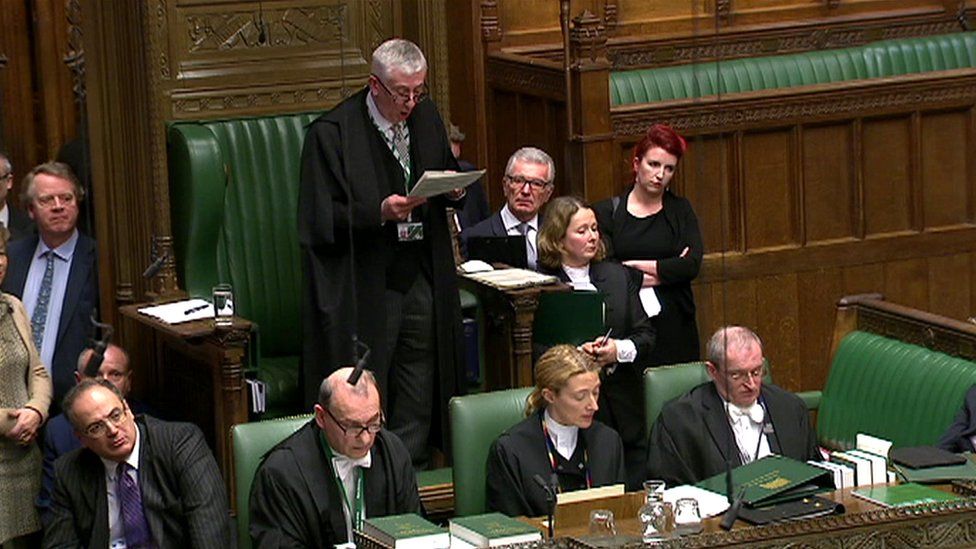Coronavirus: Commons Speaker calls for 'virtual Parliament'
- Published

MPs should be able to take part in Prime Minister's Questions and debates via video if they are unable to return to work, Sir Lindsay Hoyle has said.
Parliament has been shut down until 21 April to help prevent the spread of coronavirus.
But the Commons Speaker says it should operate "virtually" if the UK is "still in the grip" of the virus on that date.
He says a trial of virtual committee hearings had been successful - and he wants to extend the idea.
He has asked officials "to investigate how they would apply similar technology" for use in the Commons chamber.
In a letter to Commons leader Jacob Rees-Mogg, Sir Lindsay asked if he would "make representations to government" to enable the Commons to legislate, scrutinise and represent constituents in this way.
Leader of the House of Commons Jacob Rees-Mogg said that every technological solution would be considered.
Sir Lindsay urged Mr Rees-Mogg to indicate "as early as feasibly possible" if the Commons will return after its longer Easter recess on 21 April - or whether it will be extended further.
Sir Lindsay said "numerous" MPs had raised issues with him about how Parliamentary scrutiny could continue during the crisis.
"Once the House returns, if we are still in the grip of the crisis where the physical presence of members, or too many Members, in the Palace is not appropriate, I am keen that they should be able to participate in key Parliamentary proceedings virtually, for example, oral questions, urgent questions, statements,' he said.
He said it would be up to the government to authorise any changes, "as I cannot do so under my own authority".
Analysis
By Daniel Kraemer, BBC Political Research Unit
Legislators across the world are struggling to find a balance between scrutiny and safety, as they battle to find a way to keep working during the coronavirus pandemic.
None of the options are tried-and-tested - and any innovations will be improvised.
On a practical level, the UK's Parliament at Westminster, parts of which date back to the Middle Ages but which was rebuilt in the Victorian era, was not created for technological innovations.
Both the Welsh and Scottish assemblies were completed in the 21st century, making them more suitable for video links and potential remote voting.
There are basic issues with connectivity. When Labour MP Chris Bryant was running to succeed Speaker John Bercow last year, he called for "decent wi-fi and mobile signal across the Parliamentary estate".
Sir Lindsay also asked if it would be possible for the government to set up a forum of MPs during this recess, possibly via select committee chairs, who could quiz senior government representatives at set times on different days "about how things work and how they can be improved".
"MPs are being swamped right now with questions and case work from distressed constituents who need answers," he said.
"Responses cannot wait for the House to sit again."
Responding to the Speaker's letter, Mr Rees-Mogg said: "Parliament's role of scrutinising government, authorising spending and making laws must be fulfilled and in these unprecedented times that means considering every technological solution available.
"We are exploring options with the parliamentary authorities in readiness for Parliament's return."
Campaign group The Electoral Reform Society is urging the government to move swiftly to allow virtual debates.
Chief executive Darren Hughes said: "It's clear that in a national crisis, there is an even greater need for proper scrutiny, and in the absence of MPs meeting in person, the right thing to do is move this online.
"With a four week recess - in the middle of a crisis - there is a real risk that vital checks and balances are jettisoned. We cannot let this happen as dozens of life-changing decisions are made by ministers and officials each day."
On Tuesday, more than 100 MPs signed an open letter calling for the creation of a digital Parliament.
The group of MPs from Labour, the Lib Dems and the SNP say that during the "exceptional circumstances" of the coronavirus outbreak "Parliament must work exceptionally".
In the letter to the Clerk of the House of Commons, the MPs said "it is clear that Westminster is not a safe working environment and cannot be made so whilst including a representative number of MPs".
On Tuesday, Prime Minister Boris Johnson, who is self-isolating in Downing Street after being diagnosed with coronavirus, chaired the first virtual cabinet meeting, with members of his ministerial team dialling in via a video conferencing system.
Virtual Senedd
Earlier on Wednesday, The Welsh Assembly - or the Senedd - claimed to be the first major democratic institution in the UK to meet remotely.
Members used Zoom video conferencing to meet virtually from across Wales for the weekly plenary session, which usually takes place in Cardiff.